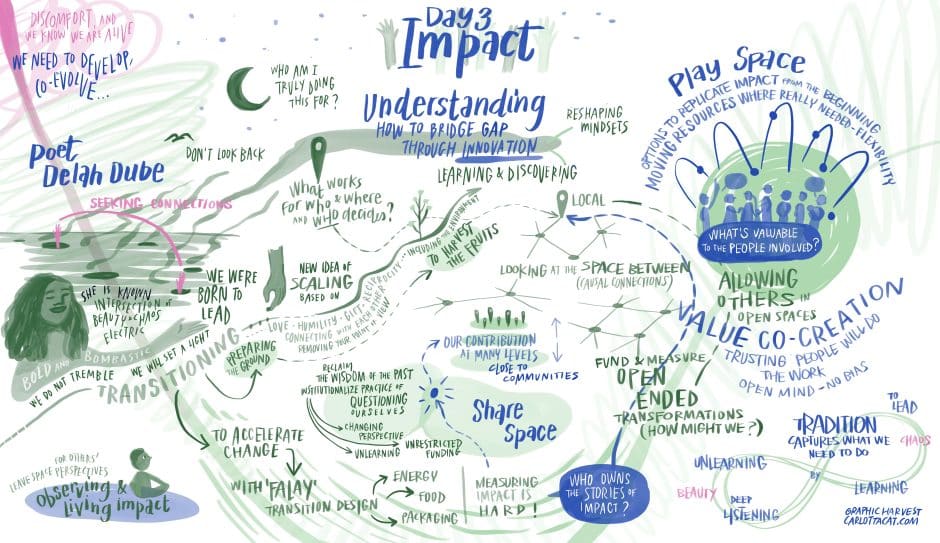Systems Innovation Learning Festival: Day Three

In 2021, Climate KIC and Sida launched the Systems Innovation Learning Partnership to bring together organisations and people to collaborate, experiment, learn and share ideas that help to support innovation and transformation across whole systems. In this series, we have heard insights from three of the partnership’s learning practitioners as they reflect on this year’s edition of the systems innovation learning festival, which took place earlier in June.
The third day of the learning festival offered a moment of pause to reflect on our earlier discussions. During the first day, we considered how to rethink traditional collaboration patterns, while on the second, we shared experiences of transition in the messy middle. For this third and final day, we directed our attention to impact, and specifically, how we can observe and measure impact when in the midst of catalysing systems change.
Before beginning the discussion, we continued our practice of invoking artistic inspiration for our thinking. With grace and gusto, Delah Dube recited a wonderful poem, and asked us all to consider the question “who am I truly doing this for?” As the discussions advanced, this lingered as one of the most important questions to bring to the practice of systems change.
Observing and living impact
Working on systemic change starts with how to catalyse profound transformation in ourselves. At Climate KIC, we’re closing the gap between where the world is and where we need to be: what we need to become. Innovation is the instrument we use to understand how we bridge that gap. But how do we measure the impact of this innovation? It’s clear that many of our current impact monitoring and evaluation tools are not fit for purpose, so instead of merely observing impact, perhaps we need to live it?
From impact to value
Kahiwa Sebire began by sharing a beautiful introduction in te reo Māori, the indigenous language of New Zealand, and explained how culture shapes her approach to work and to understanding impact.
“We start with the Māori worldview, then make space for western notions of science, but we’re grounded in indigenous principles.”
Zeynep Falay von Flittner also cautioned our reliance of scientific research principles and making conclusions based purely on data: “when we look at the bigger picture, there are uncertainties.”
Using a metaphorical framework inspired by nature, Kahiwa has reassessed the notion of impact and views her own work more in terms of how it can generate value.
“We are preparing the ground, then we are planting the seeds. Next, we’re nurturing the growth, and then we’re harvesting the valuable fruits. How are we doing all these steps well enough so we can make this value sustainable?”
The individual and community
It’s important to remember that we’re not extracting value from partners to feed our own machine and make ourselves look good – we’re bringing about change with people on the ground in respect of their contexts.
However, as Nick Grono acknowledged, this comes with its own challenges because at times, measuring the impact on a group of individuals could neglect the impact on the community at large.
“Typically, in the context of human trafficking and exploitation, there’s been a patriarchal view of intervention. Organisations would go into a situation; tell the people they are being exploited and then remove them. However, this misses the fundamental point that there is a system creating the exploitation. Instead, you have to work with communities and create resilience to break the cycle.”
What is impact? And who gets to decide?
What matters to funders doesn’t necessarily matter in local, or cultural, contexts. While the majority of funding currently comes from the developed world and often the global north, what passes for successful outcomes must be defined by the communities that funding serves as well as the broader goals, such as carbon reduction.
Penny Hawkins explained that unlearning old ways of doing things requires us to be open to a new range of possibilities:
“We need to take seriously other people’s perspectives. If we want to satisfy those asking for impact, we’re still left with the question of what effect our actions have on things. So rather than having a list of indicators, we need to look at the spaces between.”
Funding agencies funding agency
To achieve this, we agreed on the importance of shifting from controlling the outcome to taking care of enabling conditions and respecting the autonomy of the actors. As the session drew to a close, we focused on the example of SILP’s Experimentation Fund. In designing the Fund, Tom Pruunsild explained that because the team aimed to support experiments in systems innovation, they had to look beyond the notion of predetermined outcomes.
Tom brought in the Fund’s Community Grantmakers, who shared their experiences of working within this experimental approach. Namrata Mehta explained how “the language and especially, the questions in applications are important to consider – who are these experiments actually being designed for?” Shinaz Ali-Zaids expanded on this and said that it was important to give power to the communities seeking funding and allow them to shape the outcomes they want.
As the learning festival reached its conclusion, it was clear that collectively, we had made significant progress during our three days together. We ended the final day with a feeling of warmth and a renewed sense of optimism, while acknowledging that we must act on the fruits of our collaboration.
As a continuation of our discussions during this summer’s Learning Festival, we are hosting a series of conversations, which are open to the public:
25 October 2023 – Confusion and Crisis
22 November 2023 – Redefining the Development Funding Paradigm (register here)
14 December 2023 – Radical Collaboration
We are seeing an increased appetite to learn and co-create as members of the systems innovation community. If you would like to explore ways in which we can expand the field and convene more spaces of collaboration, please contact: silp@climate-kic.org
